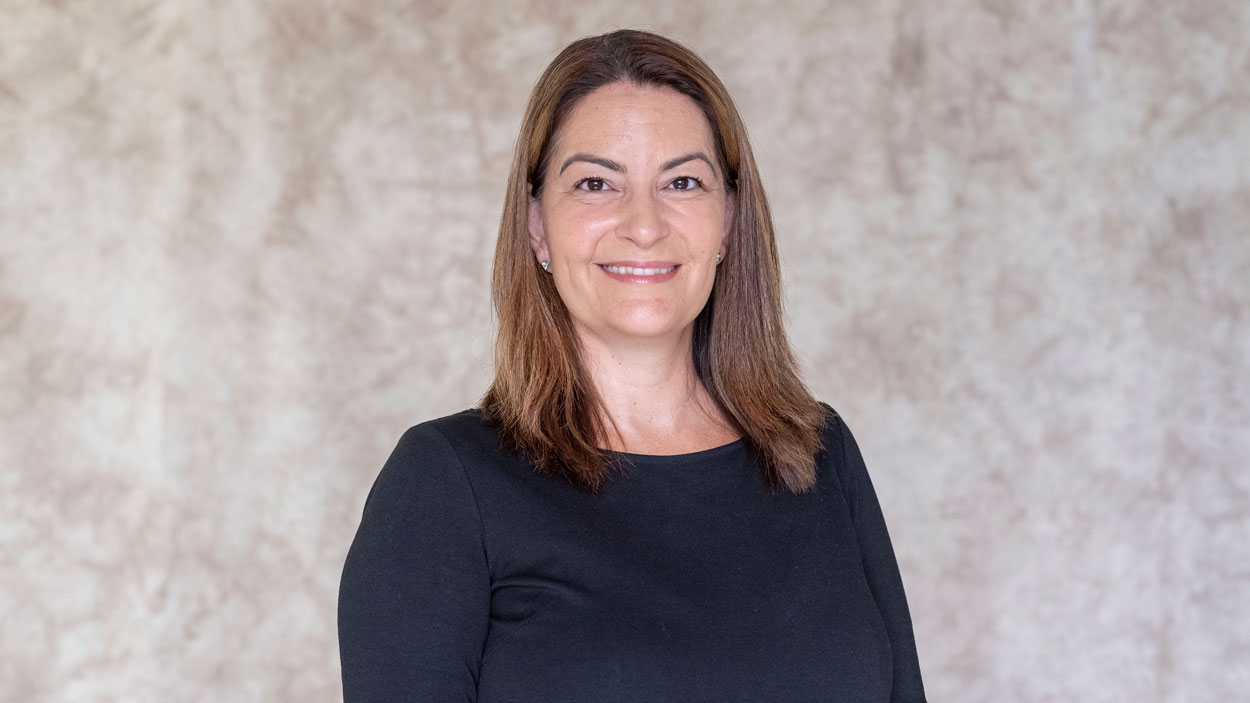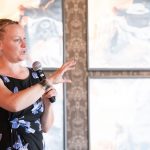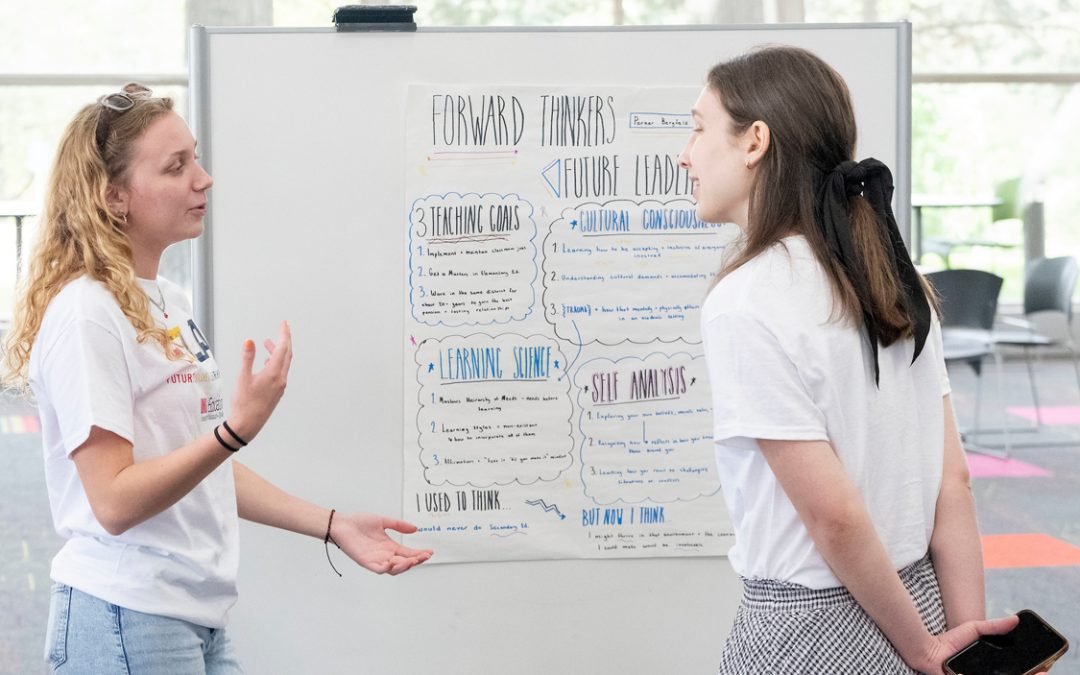
Ekin Pellegrini, founding director of UMSL’s DBA Program, began her term as president of the Executive DBA Council in July. (Photo by August Jennewein)
Ekin Pellegrini has been a leader and innovator at the University of Missouri–St. Louis from the moment she started as an assistant professor in the College of Business Administration in 2006.
She’s the founder and academic director of UMSL’s Doctor of Business Administration program, which is the only AACSB-accredited DBA program in Missouri that offers research concentrations in all areas of business administration. Now the associate dean for Graduate Business Programs at UMSL, she is a leader outside her home campus, too.
This summer, Pellegrini started her term as president of the Executive DBA Council, a global group of 72 member universities in 17 different countries. She was the president-elect from July 2023 to June 2024, is serving as president from July 2024 to June 2025 and she will be past-president from July 2025 to June 2026; each role has its own unique leadership responsibilities. She first was elected to the EDBAC board in 2019, as treasurer.
Pellegrini recently took time to answer some questions from UMSL Daily about the EDBAC and her fascinating career path.
How has your involvement with the EDBAC helped enhance UMSL’s DBA program?
In leading any academic initiative, community connectivity is vital to program success. As institutional leaders, we don’t just lead a college or university, we lead an ecosystem. My involvement with EDBAC leverages the entire global DBA network as our education partners. This benefits UMSL’s visibility and staying on the forefront of innovation in our programs, which positively impact the entire lifecycle of student success. After seven years and 60 alumni, we are still able to enjoy 93% timely graduation rate due to our proactive improvements informed by access to data-informed global best practices through EDBAC.
Now more than ever, higher education needs to think ahead and plan now for future demographic shifts, technological advances and a shifting labor market and work models. Involvement in organizations such as EDBAC brings unique academic expertise and business insights back to UMSL and fuels innovation and student success on our campus.
What do you see as the mission of the Executive DBA Council?
The mission of EDBAC is to foster excellence and innovation in executive doctoral degree programs worldwide. We inform, connect, guide and promote member programs. I am excited to lead the Executive DBA Council during such a transformative time in business education. There is much for us to look forward to as we continue to elevate rigorous, engaged scholarship to new heights, with broad societal impact that improves the lives of all stakeholders.
What are some of your goals as president?
I’m leading five large projects this year which all aim at enhancing operational workflows and user experiences in new member recruitment, member engagement, alumni connections, member data updates and building an analytics hub. In its 15th year, EDBAC is now a mature organization and my goal as the president is a strategic realignment around the organization’s long-term goals to adapt to evolving market demands and membership needs.
How have you grown personally and in your career since joining the Council board?
My Council board involvement is happening in tandem with my other leadership engagements in the community, such as serving on St. Louis Forum Board of Directors and co-founding the Immigrant Professional Women’s Network. I am constantly learning and growing through all my community leadership roles. I observe agile project management techniques and workflow optimization processes from successful industry leaders whom I work with on these boards which inform my own leadership initiatives on campus. I’m involved in high-level strategic discussions and governance issues which then enhance my capability to align our own academic initiatives with broader organizational and societal goals and market trends. All strategic insights I gain through community leadership serve as a catalyst for enhancing our own processes, curriculum design and the relevance of skills we teach our students to prepare them for their careers.
Was creating the UMSL DBA program a daunting task? When you look back at that process, what do you remember as the biggest challenges and rewards?
I started creating the DBA program in 2015 and our inaugural cohort started the program in 2017. The two years in which I learned from other universities, trained our own faculty on what DBA was and connected with regional industries to recruit students were the highlight years of my career in higher education. I learned and grew so much as a scholar and leader, and it was due to the empowering leadership of Charlie Hoffman and Kristin Sobolik, who were the CoBA dean and UMSL provost, respectively. They entrusted me with the responsibility to execute and lead this executive program effectively, and it was an unmatched learning and growing opportunity in my academic leadership foundation. Trust fosters productive and engaged leaders, and their initial trust in my leadership planted the seed for UMSL’s EDBAC presidency seat that makes us so visible and credible today.
How have you seen UMSL’s DBA program grow in the past seven years?
Every year since program launch, UMSL DBA has been recognized by CEO Magazine as a premier global DBA program. We have 60 alumni and 50 students who have produced over 200 publications and conference proceedings. We already had high expectations about this program when we created it, yet it still exceeded all our expectations on all success metrics. We are particularly inspired by the involvement of faculty from 10 departments – six in CoBA, as well as economics, English, psychology and education sciences – in delivering doctoral seminars and dissertation advising.
When you’re describing your DBA program and UMSL Business, what are some of the first things you tell someone who isn’t familiar with UMSL?
Our students commute to St. Louis for this program from all over the country, ranging from California to Puerto Rico. Most are not familiar with UMSL, but they are very familiar with UMSL DBA due to our board seat at EDBAC. Our DBA program is visible. Our alumni are also very active in recruitment. We have a DBA Alumni Network with its own leadership council, and they are actively educating applicants from their regions about the value of UMSL DBA and how the education they received at UMSL transformed their lives and careers.
When you started your academic journey with a sociology degree from Bosphorus University in Turkey, was this the career path you expected to take? What were some of the turning points that helped set you in this direction?
My mom is a professor. All of my relatives on my mother’s side of the family are educators, including my great grandmother who has a school in Turkey named after her, but I never thought for a second I would be an educator! My career goal as a young woman was to gain solid leadership experience in multinational companies and then to use that expertise for civic leadership. My father was a CEO of a multinational company, and he was involved in various non-profit initiatives all throughout Turkey. I was very fortunate to have such amazing role models to learn from. All throughout college, I volunteered in slum areas in Istanbul and taught women how to read and write; public service always fed my soul.
That’s pretty incredible. What was your first job out of college?
I started my career at Andersen Consulting and quickly progressed to management at Pfizer Pharmaceuticals and then AstraZeneca Pharmaceuticals. My career plan was working! Until I fell in love… with a Turkish graduate student who lived in the United States. We got married and I moved to the U.S. 25 years ago with the goal of continuing to build my leadership career at my then-employer while earning my doctoral degree. I already had my research question on leadership in the Middle East, and I was passionate about studying it through a scholarly lens. The textbook knowledge from research mainly from the U.S. perspective did not inform what I was noticing and I wanted to understand more.
What did you find out?
The DBA program for professionals was already well-known and available in Europe. However, it quickly became apparent to me that a doctoral program for full-time employed business professionals was not an option in the U.S. back then, and I had to make a very tough choice between doctoral training and building a successful business career. I chose the former.
Now, 25 years later, I have to pinch myself that I’m the founding academic director of an AACSB-accredited, globally recognized DBA program in the U.S. I am so elated to offer our DBA students the choice that I didn’t have, to pursue doctoral studies while also continuing to excel in their leadership careers.
You mentioned that you’re a co-founder of the Immigrant Professional Women’s Network in St. Louis. Tell me a little about that.
The mission is to connect, educate and elevate immigrant professional women to integrate and thrive in the St. Louis region. We created this group in 2022 for ourselves. The founders are all leaders in our industries, and we needed a support system that could inform the challenges that come with being a foreign-born woman leader. We now have 200 members from the Greater St. Louis region, and we have been approached by immigrant women executives from Chicago and Kansas City asking us to broaden our reach. As founders, though, we all have day-time leadership roles and we never envisioned this tremendous level of demand we are experiencing now in such a short time. We have some ideas for growth because we now vividly see how much having access to this community can be life- and career-changing and how this support network is much-needed among foreign-born women leaders in our region.














